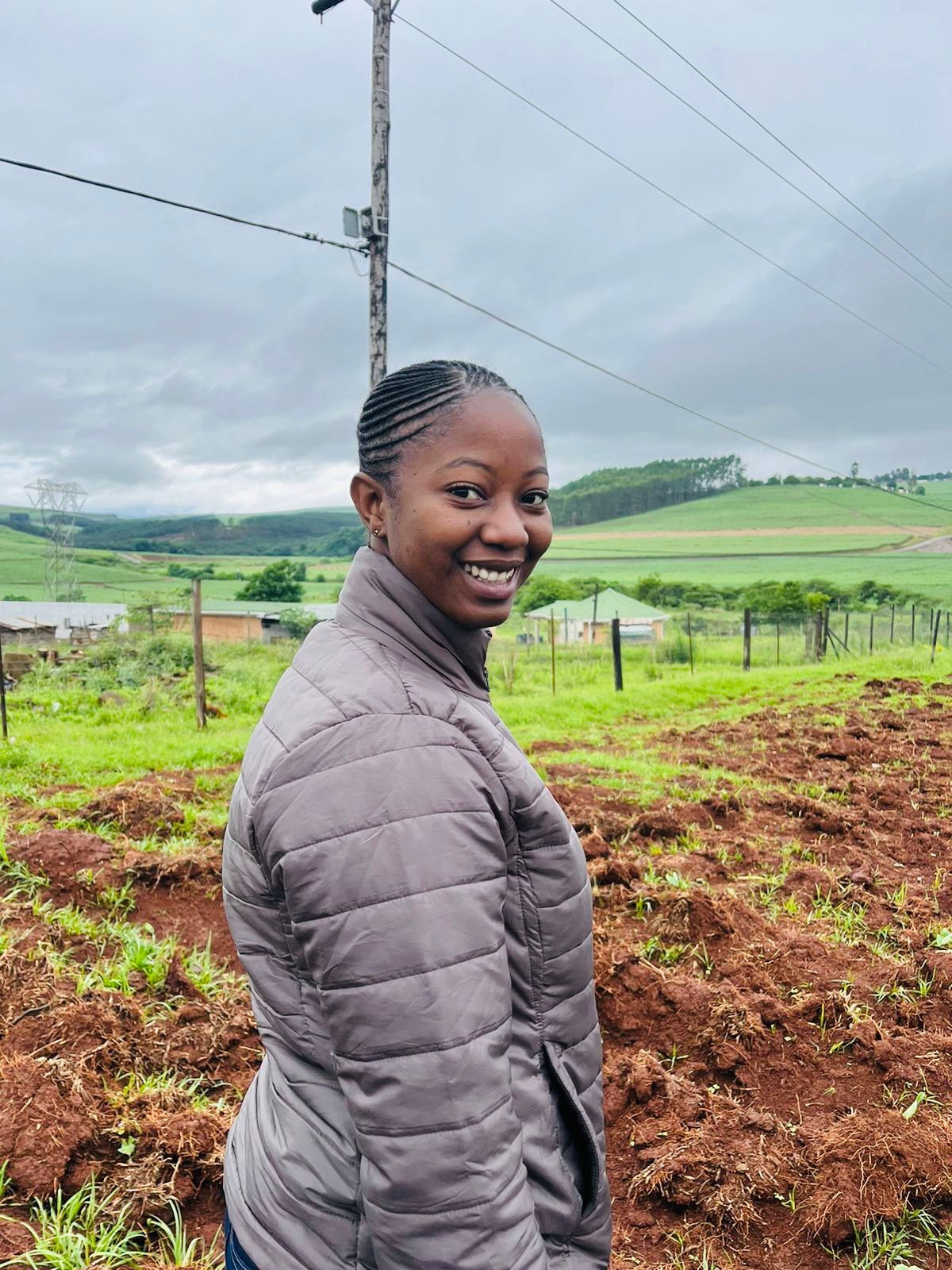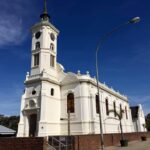By Aurelia Mbokazi-Kashe
For Banelise Mhlangu, an agricultural economist, agriculture is more than a career—it’s a calling. Growing up in Mamelodi township, she was first introduced to farming through her father, who cultivated spinach in a vegetable garden at her primary school. At the time, agriculture was unfamiliar to her and was only her third choice of study. Yet, this choice sparked a journey that led her through academia, consulting, and farming networks, equipping her with expertise in grassroots projects and capacity building. Today, as Programme Coordinator for the Community Foundation Development Programme at SGS Consulting, she merges her academic insights with practical experience to create systemic change that empowers communities while staying grounded in the realities of those who cultivate the land.

Growing up in Mamelodi, what first sparked your interest in agriculture and
development, given that farming is often seen as rural-based?
My first exposure to agriculture came through my father, who was active in our
community. He helped start a vegetable garden project at my primary school, selling spinach for R10 a bunch. I would assist him as a child, but I never considered agriculture a career. That changed when I was browsing a university prospectus and was struck by the phrase “optimise the use of finite resources to maximise and maintain ecosystems.”
Agricultural Economics became my third choice after radiology and teaching, and it’s the one I pursued. Over time, I grew passionate about agriculture as a developmental tool, especially for young people and women. Agriculture is not confined to “rural spaces”; it connects to every part of society. My parents’ commitment to community development also shaped how I view agriculture’s potential to drive change.

Who or what has inspired you most in your journey as an agricultural economist and development practitioner?
My greatest inspiration comes from the communities I’ve worked with, particularly women-led and youth-led groups who manage to thrive despite limited resources. Their resilience and innovation continually drive me to design programmes that are both practical and inclusive. While my academic grounding in Agricultural Economics provided the foundation, it is the grassroots leaders and initiative groups I’ve collaborated with that have truly shaped my journey.
I have also drawn inspiration from individuals such as Sulaimaan Patel, whose leadership, strategic thinking, and impact in philanthropy and development have been particularly influential.
What challenges have you faced working with rural communities, particularly women farmers, and how have these experiences shaped your perspective?
As a young Black female practitioner, I’ve often found myself undermined in traditional or organised community spaces because of my age, gender, or experience. Another challenge has been balancing academic theory with ground realities; what works on paper doesn’t always match the resources, infrastructure, or capacity available in communities.
Even with skills and determination, barriers such as limited finance, poor roads, lack of water, and weak market access make scaling or sustaining interventions difficult. These experiences have taught me the importance of humility, context, and listening first. They’ve also pushed me to co-create flexible, resilient programmes rather than impose rigid models, and to remain conscious of equity, especially gender dynamics, in all interventions.

Looking back, what would you say has been your proudest success or highlight
so far in your career?
One highlight was coordinating the Women in Farming KZN programme, where over 60 women-led organisations were onboarded, trained, and supported. Seeing those women strengthen their governance systems and grow their projects was deeply rewarding. I learned a great deal from that programme about the challenges faced by female farmers in agri enterprises, and it helped to launch my career.
Another was leading the intake and facilitation for Metropolitan Collective Shapers, where participatory accountability models were successfully embedded. These projects affirmed for me that inclusive development can indeed be scaled when approached with the right balance of strategy and community engagement.

Climate change is a pressing challenge for agriculture – in your view, what
practical steps can local farmers take to adapt, and how do you see yourself
contributing to this work?
Practical steps include diversifying crops, investing in water-efficient systems, adopting conservation agriculture, and integrating renewable energy. My contribution lies in embedding climate-smart practices into programme design and building farmers’ capacity to access both technical knowledge and funding opportunities. Through my published articles and project frameworks, I also advocate for inclusive climate adaptation models that place grassroots farmers at the centre, ensuring they are not left behind in the transition.

With the rise of artificial intelligence, how do you think technology can help
improve agricultural productivity and sustainability in South Africa?
AI has the potential to transform agriculture by improving planning, optimising resource use, and strengthening market linkages. For instance, smallholders could benefit from AI-driven weather forecasts or early crop disease detection. However, inclusivity is key—we must bridge the gap so that rural farmers, not only large commercial players, can access these innovations. In my field of work, I see AI as a complement to capacity-building and participatory systems.
It is already proving useful across the sector, with apps and mechanised solutions becoming more common, but the costs remain a barrier for small-scale farmers who are not always able to adopt these tools.
You’ve recently taken on the role of Programme Coordinator for the Community Foundation Development Programme at SGS Consulting. Can you unpack what this programme is about and who stands to benefit?
The Community Foundation Development Programme (CFDP) is part of SGS Consulting’s African Philanthropy portfolio. It’s about strengthening community foundations and initiative groups in Southern Africa, especially South Africa. These grassroots, place-based organisations hold assets, make grants, and build local trust to solve community challenges. We support emerging groups to formalise, improve governance, develop grantmaking and fundraising systems, and grow local leadership.
We also connect foundations to share learning, align with SDGs, and engage funders. Beneficiaries include emerging community foundations in urban, rural, and peri-urban areas, local communities receiving stronger support, and women- and youth-led groups often excluded from development. Donors also gain trusted, locally rooted channels for sustainable investment.

How do you see community foundations supporting long-term resilience and
development in South Africa’s farming and rural communities?
Community foundations are uniquely positioned because they are rooted in the very communities they serve. They can pool resources, respond quickly to challenges, and sustain development efforts long after donor projects have ended. Their strength lies in combining local knowledge with the ability to mobilise resources effectively. In farming and rural contexts, they act as anchors — supporting initiatives through governance, training, and funding channels that help communities build resilience against both economic and climate-related shocks.
What I particularly value about community foundations is that they are not confined to rigid thematic areas. Instead, they use an asset-based community development (ABCD) approach, which allows them to remain flexible and responsive to what matters most in each community.
Having worked in academia, consulting, and farming networks, what made you
decide to join SGS Consulting at this stage of your career?
I wanted to position myself in a space that balances technical expertise with scale and systemic impact. My previous roles gave me experience with grassroots projects and capacity building, but at SGS Consulting I can bring that experience into a structured that strengthens entire systems of community development. At this stage, it was important for me to move into a role where I can influence both strategy and implementation. This position offers the balance between my academic background and the opportunity to now influence both the strategic and practical sides of things. It is something new — an area I’m not yet an expert in but am eager to grow in and lean into.
For more information you can reach Banelise Mhlangu at SGS Consulting on 072 076 1910 or email info@sgsconsulting.org or contact her via LinkedIn




